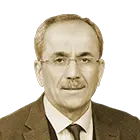Why isn’t the genocide in Palestine even up for discussion in the UK?

We can more or less follow what kind of division Israel’s crime of genocide is creating among Jews. The overwhelming majority of the Jewish world continues to believe in Israel and in Zionism, the ideology of genocide. Yet there are also those who, although part of the Jewish world, not only reject belief in Israel and Zionism but stand out with very sharp criticism of them. This is a very important situation. It is not easy for someone like me, observing these events from the outside, to predict what kinds of developments this opposition might lead to within itself. After October 7, 2023, the views of Jews who stand out for their harsh criticism of Israel and Zionism regarding the crimes committed on the historical lands of Palestine began to spread more widely in Türkiye as well. Personally, I would like to note that I have benefited from the views of these writers. From the outset, those who designed Israel as a colonial project and built it as a “Jewish State” under the mandate regime that took shape after 1917 form the overwhelming majority of those in England who remain deeply committed to Israel and Zionism. However, we need to highlight a very important distinction here. When we speak of people in England, we primarily mean the English elite classes. There are very few among these elite classes who stand out with radical criticism of Israel and Zionism. It appears that those outside the elite classes in England participate in protests against Israel’s war crimes at much higher rates. As a result, debates over England’s involvement in war crimes remain far more muted. Yet Israel and Zionism are directly the work of England, and it is England that is directly responsible for the great suffering Palestinians face today.
In my previous articles, I tried to address England’s connection to Zionism and Israel from different angles. In this context, important topics such as Christian Zionism also came up. Unfortunately, this issue has not been addressed to the extent it deserves. Yet subtopics such as the schools that Christian Zionists opened in Ottoman lands also point to dimensions of the issue that concern us directly. The absence of a deeper discussion remains a serious shortcoming. The body of Orientalist literature must also be evaluated within the same framework. If commitment to Zionism and Israel were to become a subject of debate in England, we could expect certain changes to occur. But it seems that the elite classes in England have no desire to question their commitment to Zionism and Israel. The determination of the elite classes is also shaping the world of ideas. This reminds us that one of the primary places we need to look when talking about Zionism and Israel is England. As we have stated before, ignoring the fact that the Anglo-Saxons sit at the top of the hierarchical pyramid of global hegemony leads to serious mistakes. Dispossession, exile, and genocide in the historical lands of Palestine began under the British Mandate. To better understand the problems caused by the British Mandate, it is worth watching the recently released film Palestine 36. England’s support for Zionist Jewish terror groups dates back a century. This is not a coincidence. Ideas such as the notion that Jews “captured and rule England,” as some believe, make England’s role in the Palestinian question invisible.
Alongside England, we must specifically highlight that Germany, France, and the United States also play leading roles in today’s genocide. These countries are not involved in the genocide on the historical lands of Palestine because they submitted to the Jews. What needs to be examined is the five-hundred-year colonial history of Western European countries. Even major topics such as the Enlightenment and the French Revolution must be assessed within this same context. This would also be a step forward for us.
At times openly and at times indirectly, we express this: I believe we have been trapped in a very shallow kind of opposition in Türkiye. For years, people in this country have made it a habit to curse their own history for various reasons. Some curse Abdulhamid, some Enver Pasha, and others different historical figures. Suddenly the agenda shifts again. Yet we are passing through a period in which humanity is witnessing events unprecedented in history. To see the problems at their source, we need to look much further.
Advertisement








Comments you share on our site are a valuable resource for other users. Please be respectful of different opinions and other users. Avoid using rude, aggressive, derogatory, or discriminatory language.